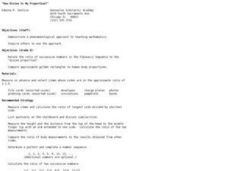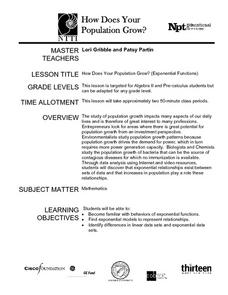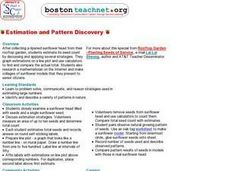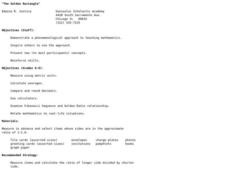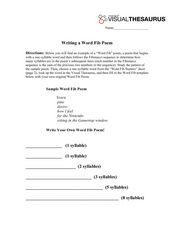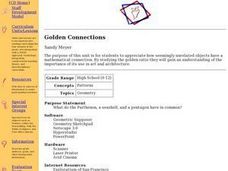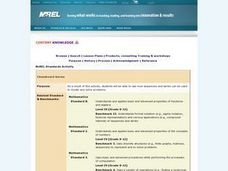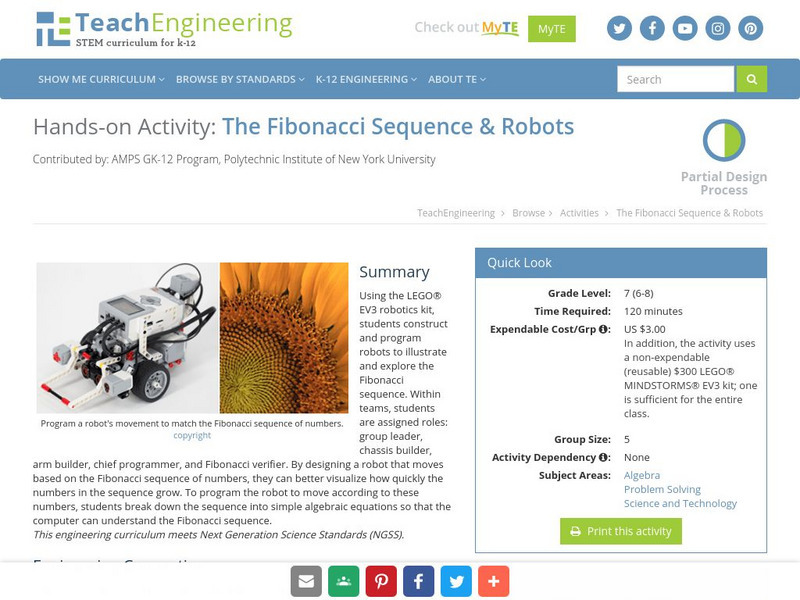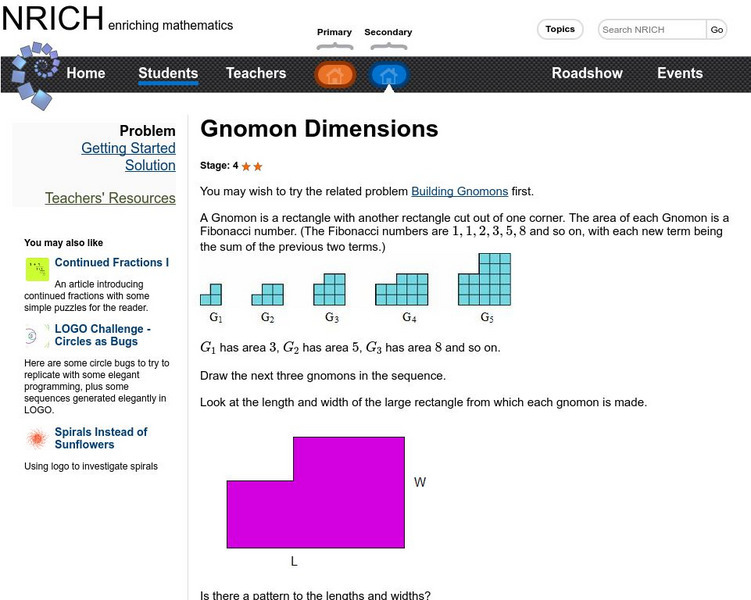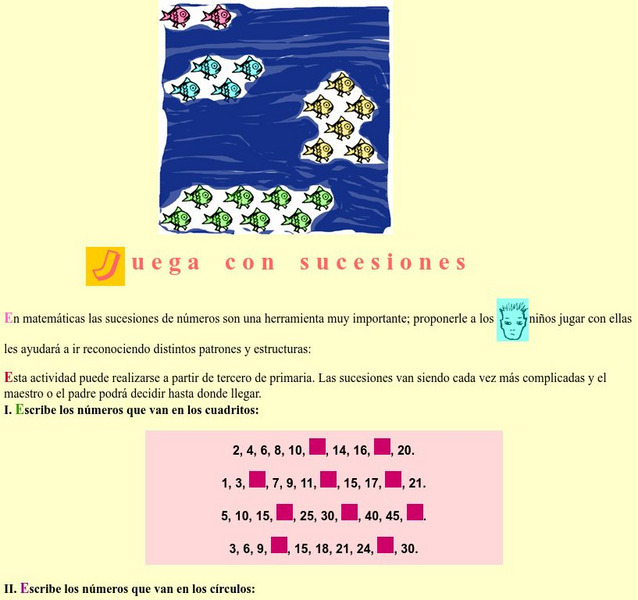Curated OER
"How Divine Is My Proportion?"
Eighth graders explore the concept of the divine proportion/golden ratio. In this Fibonacci Sequence exploratory instructional activity, 8th graders measure the length and width of various objects to see which items have a divine...
Curated OER
How Does Your Population Grown?
Do you know how the population has grown of your community? Can you predict the population over the next half century? Can we find an algebraic model that matches our data? These along with many more questions can be researched by...
Curated OER
Patterns Across Cultures: The Fibonacci Sequence in Visual Art
Young scholars study the origin of the Fibonacci Sequence. In this investigative lesson students identify works of art where Golden Spiral or Ratio appear.
Curated OER
Guess That Sequence!
Students analyze number sense by participating in a pattern identification activity. In this number sequence lesson, students examine several groups of numbers and identify the sequence in the group before adding on to it. Students check...
Curated OER
Secret Sequences
Students are exposed to different types of sequences. in this sequencing lesson, students learn about simple sequences, multiplication sequences, declining sequences, the Fibonacci sequence and other sequences.
Curated OER
Estimation and Pattern Discovery
Students collect sunflower heads from their community garden. They estimate its seed count using different strategies. They graph their estimations on a graph and use calculators to find the actual total.
Curated OER
Where Math Meets Poetry
Learners identify Fibonacci's sequence of numbers and use the pattern to write poetry with one syllable words. For this math and writing lesson, students identify Fibonacci's sequence of numbers and learn about this early mathematician....
Curated OER
The Golden Rectangle
Students explore the concept of the golden ratio. In this golden ratio lesson, students measure objects to determine if their measurements fit the golden ratio. Students calculate the average measurements of the class.
Curated OER
Numbers in Nature
Students identify numbers in nature. In this algebra lesson, students solve problems using Fibonacci sequence as it is expressed in nature. They research the Fibonacci's pattern as it relates to numbers.
Curated OER
Proportionality: Modeling the Future
Students explore and examine how patterns, measurement, ratios and proportions are utilized in the research development and production of airplanes. They meet a pilot from the Federal Aviation Association who describes the growth of air...
Curated OER
Writing a Word Fib Poem
Students write a word fib poem using different word starters and different number of syllabled lines. Students write 6 lines in the poem.
Curated OER
The Function Box
Learners explore arithmetic and numerical patterns. After observing a teacher created function box, students describe a pattern and predict what will "come out" of the function box. They explore patterns such as geometric shapes,...
Curated OER
What's My Function?
Young scholars use input / output tables to help them solve algebraic equations. They use patterns and relations to represent and analyze mathematical situations using algebraic symbols.
Curated OER
How Many Cells Are Born in a Day?
Students predict the number of cells after a series of cell divisions. In this cells lesson students create a graph of their results and create a patterned drawing.
Curated OER
Golden Connections
Students determine the ratio of pairs of consecutive terms in the Fibonacci Sequence. Using four different colors, they create a golden rectangle in either two or three dimensions. They use photographs to create two collages using...
Curated OER
Chessboard Series
Students work together on a word problem. They write a written report of the answer. They participate in a chessgame in which the answers are used.
Curated OER
Space Tiling with Captain Planet
Fifth graders Apply the symmetry and angle properties of polygons, using symmetry and angle properties of polygons to solve practical problems. They study tessellates and explain why a shape tessellates.
Curated OER
Arithmetic Tricks
In this arithmetic tricks activity, students learn tricks and complete problems involving exponents and multiplication x 11. Students complete 11 problems total.
Math Is Fun
Math Is Fun: Common Number Patterns
Developed by a mathematics teacher from the UK, this page identifies and illustrates several common number patterns.
TeachEngineering
Teach Engineering: The Fibonacci Sequence & Robots
Using the LEGO NXT robotics kit, students construct and program robots to illustrate and explore the Fibonacci sequence. Within teams, students are assigned roles: group leader, chassis builder, arm builder, chief programmer, and...
Mathigon
Mathigon: Algebra: Fibonacci Numbers
This lesson focuses on Fibonacci numbers, a pattern based on the sum of the two previous numbers. It offers examples and practice exercises using some form of Fibonacci numbers.
University of Cambridge
University of Cambridge: Nrich: Gnomon 1
This interactive activity gives you an opportunity to explore a specific number pattern named the "Fibonacci sequence." See what other patterns you can discover while you manipulate the blocks. There is a "Printable Page" link if you...
University of Cambridge
University of Cambridge: Nrich: 1 Step 2 Step, Fibonacci
See if you can find the patterns on the staircase. Mr. Fibonacci would be so proud to know you found the solution. You can check your solution right at this nifty one-page website.
Ministry of Education and Employment of Spain
Red Escolar: Juega Con Sucesiones
In Spanish. Find out about patterns and number sequences and read about some of Fibonacci tricks.


